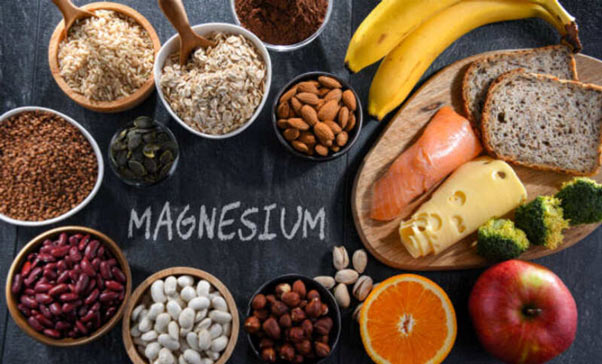When it comes to taking care of our health, there are a number of nutrients and minerals we should be aware of. Magnesium is an essential mineral that plays a pivotal role in hundreds of different biochemical reactions inside the body, positively impacting everything from energy levels and immunity to cardiovascular function. This powerful nutrient helps maintain healthy bones, modulate hormones, regulate inflammation, and more - all while providing neurological support and helping boost overall brain functioning. With countless health benefits to keep in mind, let’s take a closer look at the power of magnesium!
What is Magnesium?
Magnesium is a vital mineral that is essential for a healthy body. It is involved in numerous cellular and biochemical processes throughout the body, which includes protein synthesis, muscle and nerve function, blood pressure regulation, and bone strength.
Why is it important for our health?
Magnesium also plays a crucial role in over 300 enzymatic reactions in the body, making it necessary for overall health and wellness. A magnesium deficiency can lead to various health problems, such as muscle cramps, migraines, anxiety, and high blood pressure. That's why it's essential to ensure that you get enough magnesium in your diet or by taking supplements. With adequate magnesium, you can reap the benefits of this essential mineral and enjoy optimal health.
How to get the recommended daily dose of Magnesium?
If you are looking for a mineral that plays a crucial role in the proper functioning of your body, you might want to consider magnesium. It may not always be easy to get the recommended daily dose of this mineral. There are several ways to get it.
For instance, you can eat a balanced diet that incorporates foods that are rich in magnesium such as nuts, seeds, and leafy greens. You might want to consider taking magnesium supplements, which can be bought over the counter, in the recommended doses to ensure that you get the right amount of the mineral per day.
Dietary Sources of Magnesium: Natural Ways to Reach Your Daily Intake:
As mentioned earlier, there are various dietary sources of magnesium. Some foods that are rich in magnesium include leafy greens like spinach and kale, nuts like almonds and cashews, seeds such as pumpkin and sunflower seeds, legumes like beans and lentils, whole grains like brown rice and quinoa, fish like salmon and halibut, and even dark chocolate.
Topical Magnesium: A Unique Approach to Absorb Your Daily Dose:
Another way to get your daily dose of magnesium is through topical applications. This method involves absorbing magnesium through the skin, which can be highly effective for those who have trouble with oral supplements or have digestive issues that make it difficult to absorb nutrients from food.
Magnesium-Rich Recipes: Delicious Options for Boosting Your Intake:
Incorporating magnesium-rich foods into your diet can be easy and delicious. Here are a few recipes to try:
- Spinach, Kale, and Quinoa Salad with Toasted Almonds - This salad is packed with nutrients and flavor from the leafy greens, quinoa, and almonds.
- Lentil and Vegetable Curry - A hearty and healthy meal that includes magnesium-rich lentils.
- Baked Salmon with Pumpkin Seed Crust - A tasty and nutritious way to get your dose of magnesium from both the salmon and pumpkin seeds.
Different forms of Magnesium and their benefits:

Magnesium is an essential mineral that plays a crucial role in our overall health. It is involved in several bodily functions, including nerve and muscle function, protein synthesis, and energy production. Interestingly, there are different forms of magnesium, and each can provide unique benefits. For example, magnesium citrate is known for its excellent absorption and is often used to support bowel regularity.
Magnesium glycinate is another popular form that is easy to absorb, well-tolerated, and may help with anxiety and stress. Magnesium oxide is less expensive and commonly used to support bone health.
Magnesium Citrate: The Essential Aid in Digestion:
Magnesium citrate is a combination of magnesium and citric acid, which helps support regularity in bowel movements. It works by pulling water into the colon to soften stool and stimulate intestinal contractions, making it easier to pass waste. This form of magnesium is often used as a short-term solution for occasional constipation or irregularity.
Magnesium Glycinate: An Effective Combatant Against Stress and Anxiety:
Magnesium glycinate is a popular form of magnesium due to its high absorption rate and gentle nature on the stomach. This makes it an effective solution for those who struggle with stress, anxiety, and difficulty sleeping. It helps calm the mind and body, promoting relaxation and better sleep.
Magnesium Oxide: The Economical Choice for Bone Health:
Magnesium oxide is a form of magnesium that is often used to support bone health. It works by converting to magnesium bicarbonate in the stomach, providing a source of alkaline for the body. This helps regulate pH levels and maintain healthy bones.
Magnesium Sulfate: Gaining Popularity in Healthcare Practices:
Magnesium sulfate, also known as Epsom salt, is a popular form of magnesium that has been used for centuries in healthcare practices. It is often used in baths or foot soaks to help relieve muscle soreness and tension, improve circulation, and promote relaxation.
Magnesium Chloride: The Topical Solution for Muscle Relief:
Magnesium chloride is another form of magnesium that has gained popularity for its topical use in creams, oils, and sprays. When applied directly to the skin, it can help alleviate muscle pain and tension, reduce inflammation, and improve overall skin health.
Magnesium L-Threonate: The Brain Booster:
Magnesium L-threonate is a unique form of magnesium that has shown promising results in boosting brain function and supporting cognitive health. It is known for its ability to cross the blood-brain barrier, making it more easily absorbed by the brain. This form of magnesium may help improve memory, focus, and overall brain performance.
How Magnesium helps with stress relief, relaxation, and improved sleep quality?

Magnesium is a mineral that plays a key role in various bodily processes, including stress management, relaxation, and sleep quality. While stress is a natural response to everyday demands, excessive levels of stress can take a toll on our wellbeing. Magnesium helps reduce stress by regulating the release of cortisol, a hormone produced during stress.
Magnesium promotes relaxation by relaxing the muscles and calming the nervous system. This leads to improved sleep quality and better overall health. Incorporating magnesium into your diet can have a significant impact on your stress levels and help you achieve restful sleep.
The potential side effects of too much magnesium consumption:
Magnesium is an essential mineral that plays a pivotal role in our body's functioning. It aids in the regulation of blood pressure, protein synthesis, and nerve and muscle function. However, it's equally important to note that consuming too much magnesium can have adverse side effects.
Overindulging in magnesium-rich foods or supplements can lead to an upset stomach, diarrhea, nausea, and abdominal cramping, among others. It's crucial to maintain a balance and be mindful of our magnesium intake to prevent any unwanted outcomes and derive the maximum benefits from this wonder mineral.
Strategies for incorporating magnesium into your daily routine:
Magnesium is one of the most important minerals for overall health and wellbeing, yet many people do not get enough of this vital nutrient in their diet. Fortunately, there are many strategies for easily incorporating magnesium into your daily routine. One of the easiest ways is to make sure you're eating plenty of magnesium-rich foods, including leafy greens, nuts and seeds, and whole grains.
Conclusion:
Magnesium is an essential mineral that plays a notable role in our overall health. Our bodies require magnesium to maintain healthy bones and teeth, to regulate our nervous system, muscles, and digestion. There are many different sources of magnesium, including supplements, topical creams, foods or beverages. When taken as directed and combined with a healthy lifestyle that includes regular exercise and stress relief activities such as yoga or meditation, we can reap all the benefits that magnesium has to offer: improved relaxation, sleep quality and decrease in stress levels.












